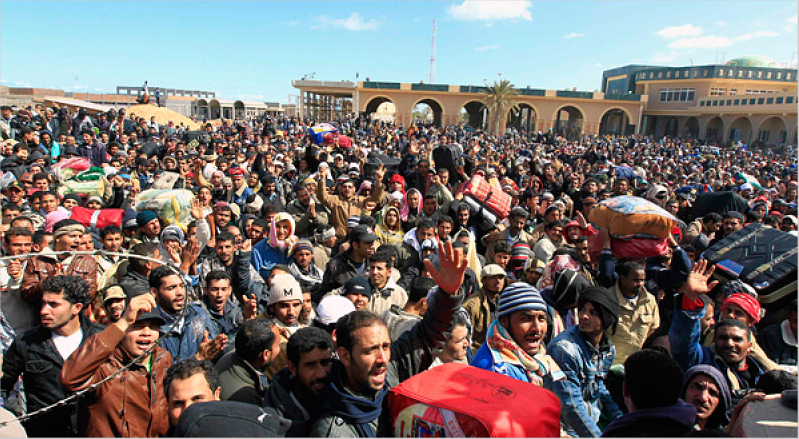
More than 20 years after Saddam Hussein's soldiers in Iraq killed his brother in front of him, Ali Alghazally still suffers from night terrors he blames on post-traumatic stress disorder (PTSD), a common problem among refugees often left untreated.
As the United States prepares to take in 10,000 or more Syrian refugees in the coming year, social service groups are urging more funding for mental health counseling for cases like Alghazally's, saying it makes resettlement easier.
The 48-year-old finally began undergoing psychotherapy last year in Dearborn, a southeastern Michigan city that is home to many Arab-Americans - but not before becoming addicted to anti-anxiety pills and leaving his job as a limousine driver.
"The best time to get treatment is once it's fresh and it's new," said Sharehan Ayesh, Alghazally's counselor at the Arab Community Center for Economic and Social Services in Dearborn, which calls itself the nation's largest social service agency for Arab-Americans.
"We're having to do 20 years' worth of repair that should have been done" earlier, Ayesh said recently.
President Barack Obama has pledged to take in thousands more refugees from Syria's civil war.
Many of those fleeing the violence - which has included barrel bombs, chemical weapons, gunfire and summary executions - will need mental health counseling.
But if history is any guide, few will get it.
Because it competes with basic needs such as housing, schooling and job placement, counseling for refugees often is neglected.
BACK TO NORMAL
This is the case even though refugees who learn to cope early on with PTSD tend to settle more easily into the United States and benefit more from other services, said officials from groups that will soon be assisting Syrian new arrivals.
"Folks really need to be able to get back to their lives: school, work, things that they were doing in their own countries," said Alison Beckman, clinical supervisor at the St. Paul, Minnesota-based Center for Victims of Torture, one of the largest treatment centers of its kind in the United States.
But refugees with PTSD or depression often cannot resume those aspects of their lives because their symptoms are so severe, she said.
Fear, uncertainty and trauma can combine in PTSD - an illness that can affect veterans and other survivors of wars or other major traumas - to cause violent flashbacks, an inability to trust others and other symptoms.
Between 15 percent and 20 percent of all refugees globally have mental health problems, but fewer than 1 percent of the total will get care for them, Mark van Ommeren, a public mental health adviser for WHO, said in an email.
In general, mental health care in the United States has long been criticized as inadequate. More than 43 million American adults experience mental illness annually, but nearly 60 percent of them did not receive care for it in the past year, according to the National Alliance on Mental Illness, an advocacy group based in Arlington, Virginia.
MONEY TIGHT
A lack of funding is part of the problem. WHO estimated that for every $1,000 spent globally on humanitarian aid, only $1 goes toward mental health care, according to a 2011 study, the most recent year for which numbers were available.
"That is way too little," van Ommeren said. He said care is essential so that refugees can perform day-to-day activities, engage with their communities and hold down a job.
The U.S. Office of Refugee Resettlement added four more funded programs to its Survivors of Torture initiative this fiscal year, bringing the total nationwide to 34, spokesman Kenneth Wolfe said. But, despite calls from physicians and lawmakers to increase the agency's $11 million annual budget, it remains the same.
To treat traumatized refugees, programs typically offer talk therapy, group counseling and physical rehabilitation. Another key aspect is psycho-education - teaching refugees about mental health - to help combat cultural stigmas that often prevent them from asking for help.
Officials said many Syrians are expected to resettle in areas where their community is already being established: largely in Michigan, Texas and California, according to U.S. State Department data mapping the distribution of Syrian refugees so far this year. (For a graphic on Syrian and other refugees admitted to the United States in fiscal year 2015, click on http://reut.rs/208UR7W)
The Detroit area, a common destination for the past 15 years for Iraqi refugees, is ready for a Syrian influx, said Hassan Jaber, executive director of the Arab Community Center for Economic and Social Services in Dearborn.
At resettlement agencies, officials rush to meet basic needs while urging refugees to become self-sufficient as soon as possible, before government aid runs out.
"The clock starts ticking really right when they arrive," said Aaron Rippenkroeger, chief executive of Refugee Services of Texas, which has centers in five major cities in the state. He called the time pressures a shortfall of the U.S. resettlement model.
"There's not a lot of time for them to engage with the facts of what they've been through," he said.
(Editing by Kevin Drawbaugh, Stuart Grudgings and Jonathan Oatis)






